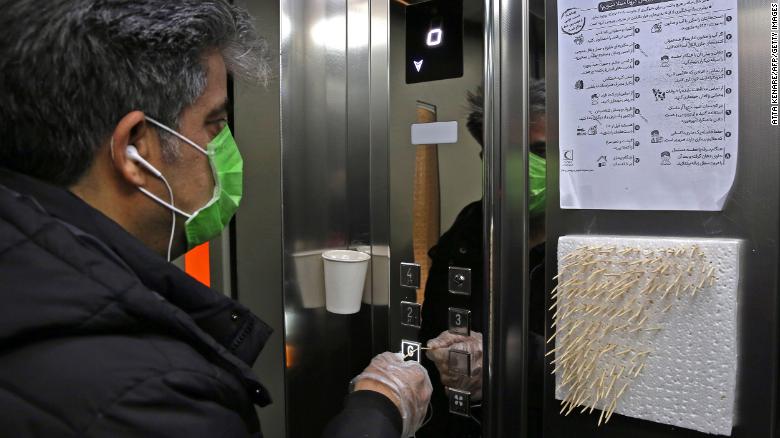(CNN Business) –– Before the pandemic there were many reasons to feel anxiety inside an elevator: from being huddled in a small space with strangers to being trapped between floors.
Now, as coronavirus cases already exceed 18 million worldwide, many people are concerned about getting covid-19, either through someone else in the elevator or through buttons.
Software engineer Bhavin Ahir felt this fear in the apartment block where he lives since March, when the Indian government implemented what would become a four-month confinement.
Ahir lives on the 12th floor of a 13-level apartment block in the western state of Gujarat. This place houses hundreds of people who take the elevator several times a day.
"There is always fear of touching the buttons, so I decided to make some developments focused on that aspect," said Ahir, founder of the Indian electronics company TechMax Solution.
People around the world have found ways to avoid touching elevator buttons. This man in Tehran a toothpicks.
Unable to leave his apartment, Ahir set to work in his extra room, prototyping a product that is now known as "Sparshless" ("sparsh" means touch in Sanskrit and "less" is sin in English).
The system consists of a panel that is installed next to the existing elevator buttons. It allows users to select a floor by pointing their finger at each button with a distance of 10 to 15 millimeters, which triggers an infrared signal that tells the elevators where to go.
Sparshless units are also installed at the elevator entrances on each floor, Ahir said. Users place their hands under the arrows on the unit to indicate whether they want to go up or down.
- READ: A woman with covid-19 but asymptomatic and an elevator: the mystery of an outbreak in China
It is a completely contact-free system and designed for a world where people have become cautious about everything they touch.
Dirtier than a toilet seat
We have known for a long time that elevator buttons are dirty. Studies have found more bacteria on elevator buttons than on toilets.
Models show that the risk of contracting coronavirus by people traveling in elevators is relatively low, since spaces are usually well ventilated and passengers spend little time inside.
However, since the virus is believed to survive on some surfaces for up to 72 hours, it is not surprising that people feel anxious about touching buttons.
- LOOK: How can the coronavirus spread through the bathroom pipes?
In that sense, the pandemic has led to some creative solutions. In Thailand, a mall installed pedals so customers can mark their floor with their feet. And in Japan, a toothpick company markets "contactless toothpicks" for pressing buttons. In the United States, the Centers for Disease Control and Prevention (CDC) recommends that people avoid touching buttons directly and instead "use an object (such as a pen) or their knuckles."
In India, Ahir sought more sophisticated technology.
In a shopping mall in Bangkok, a woman uses a pedal to mark the floor to which she is headed.
Manufacture the product
Ahir usually works in the office of his company, located in the city of Surat, where he employs 12 permanent workers. The 31-year-old entrepreneur started his TechMax Solution business in 2009, right after graduating from college. The company's key products are safety devices, but during the four-month confinement in India, the job was sold out. During that time "we didn't earn a single rupee," he said.
So Ahir responded to the crisis by developing the Sparshless system, and tested the first prototypes on its neighbors. The initial models were adjusted when he discovered that daylight caused false readings. The system should also be installed in such a way that it did not affect the normal operation of the elevators, nor the warranty.
With those problems solved, the next step was to find clients. Which has not been easy during national confinement, Ahir explained, but so far, the units have been installed in 15 buildings in India.
To use Sparshless-equipped elevators, people must place their hand under a unit that has infrared transmitters.
Sumit and Sushila Katariya live in one of those buildings. Sumit is an elevator consultant, and Sushila is a physician at Medanta Hospital, southwest Delhi, and has treated hundreds of coronavirus patients since March.
Sumit Katariya installed the contactless buttons on the personal elevator of his two-story housing complex to reduce the risk of his wife infecting the family and their visitors, should he contract the virus. He says the panel has been working "perfectly fine" since it was installed about a month ago.
Ahir noted that he received inquiries from Kuwait, the United Arab Emirates and Brazil about his panels. It hopes to sell up to 1,500 units by the end of the year, an ambitious target for a small company with a manufacturing plant located in the country with the third-highest number of coronavirus cases in the world.
It is a "difficult situation," he said, but "I always think positive."
elevatorscovid-19elevadoresIndiaPandemia

